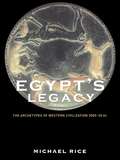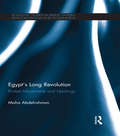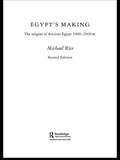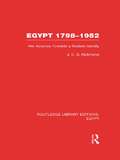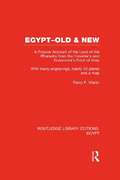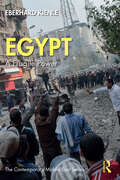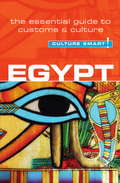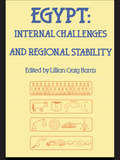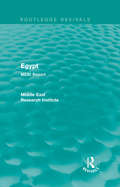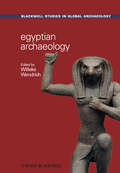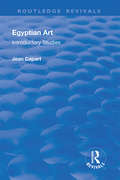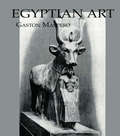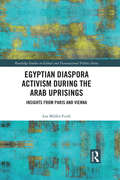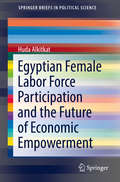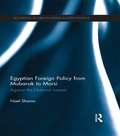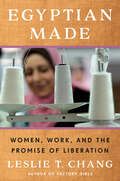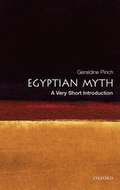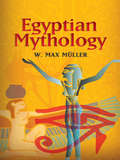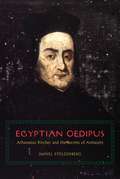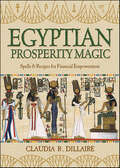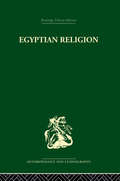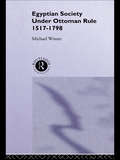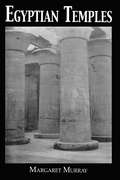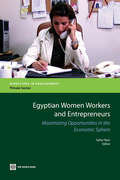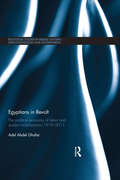- Table View
- List View
Egypt's Legacy: The Archetypes of Western Civilization: 3000 to 30 BC
by Michael RiceDrawing on Jungian psychology to show why Egypt has been so important in the history of Western civilisation, Michael Rice explains the majesty and enduring appeal of Egyptian civilization. Jung claimed that there exist certain psychological drives dormant in our shared unconscious: these are the archetypes. From the omnipotent god to the idea of the nation state, the formulation of most of these archetypes is owed to ancient Egypt. Michael Rice sets out to recover the sense of wonder that the Egyptians themselves felt as they contemplated the world in which they lived, and the way they expressed that wonder in the religion, art and literature. He traces the story of Egyptian civilization from its emergence in the third millennium BC to its transformation following the Macedonian conquest in 30 BC.
Egypt's Long Revolution: Protest Movements and Uprisings (Routledge Studies in Middle Eastern Democratization and Government)
by Maha AbdelrahmanThe millions of Egyptians who returned to the heart of Cairo and Egypt’s other major cities for 18 days until the eventual toppling of the Mubarak regime were orderly without an organisation, inspired without a leader, and single-minded without one guiding political ideology. This book examines the decade long of protest movements which created the context for the January 2011 mass uprising. It tells the story of Egypt’s long revolutionary process by exploring its genealogy in the decade before 25 January 2011and tracing its development in the three years that have followed. The book analyses new forms of political mobilisation that arose in response to ever-increasing grievances against authoritarian politics, deteriorating living conditions for the majority of Egyptians as a consequence of neo-liberal policies and the machinery of crony capitalism, and an almost total abandoning by the state of its responsibilities to society at large. It argues that the increasing societal pressures from different quarters such as labour groups, pro-democracy movements and ordinary citizens during this period culminated in an intensifying culture of protest and activism that was vital in the lead up to the dramatic overthrow of Mubarak. It, also, argues that the features of these new forms of activism and political mobilisation have contributed to shaping the political process since the downfall of Mubarak. Based on research undertaken since 2002, Egypt’s Long Revolution is an essential resource for scholars and researchers with an interest in social movements, comparative politics and Middle East Politics in general.
Egypt's Making: The Origins of Ancient Egypt 5000-2000 BC
by Michael RiceAlready a classic and widely used text, this second edition has been wholly revised and updated in the light of the many discoveries made since its first publication. Michael Rice's bold and original work evokes the fascination and wonder of the most ancient period of Egypt's history. Covering a huge range of topics, including formative influences in the political and social organization and art of Egypt, the origins of kingship, the age of pyramids, the nature of Egypt's contact with the lands around the Arabian Gulf, and the earliest identifiable developments of the historic Egyptian personality. Egypt's Making is a scholarly yet readable and imaginative approach to this compelling ancient civilization.
Egypt, 1798-1952: Her Advance Towards a Modern Identity (Routledge Library Editions: Egypt)
by J.C.B. RichmondEgypt was the first of the Arab-speaking Muslim countries to come into close contact with modern European states. The experience was not a particularly happy one. It resulted in political and economic subjugation and in the breakdown of her traditional culture and society: but it led also to her emancipation from the Ottoman Empire and to the eventual development of a modern and autonomous Egyptian identity. The central aim of this book is to trace the history of Egypt during this period of change, from Napoleon’s invasion at the end of the eighteenth century to the Free Officer’s Revolution in the middle of the twentieth. The author describes the effects of European – particularly British and French – involvement on the course of Egyptian history, shown variously for example in her changing trade pattern, in her forced participation in two world wars and in the planning and construction of the Suez Canal. One of these effects was to stimulate the development of Egyptian nationalism and the emergence of her own leaders. A major factor in the course of Egyptian history, and one of which the author is constantly aware, was the European ignorance of Islamic and Arabic thought and attitudes, which was largely responsible for the misunderstandings and conflicts which characterized the period. The book provides a valuable analysis of interaction between communities with different and sometimes opposing value systems. To understand this interaction is essential to the study of the history, politics and culture of the Middle East.
Egypt, Old and New: A popular account. With many engravings, nearly 50 coloured plates and a map (Routledge Library Editions: Egypt)
by Percy Falcke MartinA work of history, culture, politics, economics, packed with period photographs and period insights.
Egypt: A Fragile Power (The Contemporary Middle East)
by Eberhard KienleFocusing on authoritarian rule, unresolved economic challenges, and external dependency, the volume explains the salient political and economic features of contemporary Egypt against the backdrop of its history since the beginning of the 19th century. Presenting a comprehensive account of developments, it challenges common assumptions about secularists, Islamists, and revolutionaries, as well as 'modernization', 'economic reform', and political stability. Discussing domestic politics, economic change, and external relations since 1945, the author argues that Egypt continued to draw a degree of strength from sustained state-building activities, which its pre-colonial rulers could pursue in a favourable international environment and the partly related emergence of the country as a focal point of collective identity. More consolidated than many other states in the global south, Arab and non-Arab alike, independent Egypt, despite changing economic strategies, remained a (lower) middle-income country and despite repeated political contestation, most recently in the Arab Spring, continued to suffer from autocratic rule. Such continuity reflects not only the interplay between political forces at home, dominated by the military, and inconclusive economic policies but also the external constraints under which governments and other actors in the global south have to act. Based on numerous primary and secondary sources in various languages, including Arabic, and years of fieldwork, the book is a key resource for scholars of all levels, journalists, policymakers, and diplomats interested in comparative politics and the political economy of the Middle East and Egypt.
Egypt: Culture Smart!
by Jailan ZayanThe best-selling Culture Smart! series continues where other guides leave off. Whether you are travelling on business or pleasure, long-term or short, Culture Smart! is your pocket-sized cultural roadmap that never goes out of date. Providing essential information on attitudes, beliefs and behaviour in different countries, these concise guides enable you to steer clear of embarrassing mistakes, feel confident in unfamiliar situations, and arrive at your destination with local knowledge on what to expect and how to behave. Culture Smart! has become as essential as remembering to pack your passport. Be a responsible traveller with Culture Smart!, the smarter way to travel.
Egypt: Internal Challenges and Regional Stability
by Lillian C HarrisKassem provides a concise and accessible introduction to Egypt, including chapters on domestic politics, foreign policy, economy and state formation. It will be of interest to anyone studying Egypt from a social science perspective.
Egypt: MERI Report (Routledge Revivals: Middle East Research Institute Reports)
by Middle East Research InstituteFirst published in 1985, this study, focusing on Egypt, looks at the underlying reasons why certain political, economic and social events have taken place in the country’s history. It provides vital analysis of the political and economic issues of the country, and those that have affected it, as well as providing statistical material on all the key data of the political economy.The book was originally published as part of the Middle East Research Institute (MERI) Reports on the Middle East which quickly established themselves as the most authoritative and up-to-date information on the state of affairs in the region.
Egyptian Archaeology (Wiley Blackwell Studies in Global Archaeology #15)
by Willeke WendrichEgyptian Archaeology explores ancient Egypt using a uniquely archaeological approach, drawing on original research to both synthesize and challenge existing scholarship. Written by leading Egyptologists, based on original research and fieldwork Illustrates how practical research is a vital component of any theory-based discussion about the ancient world Examines the cultural and historical processes of ancient Egypt from a global perspective Visually engaging with over 80 illustrations Chapters explore fundamental issues and themes, but focus on specific periods and key archaeological sites
Egyptian Art: Introductory Studies (Routledge Revivals)
by Jean CapartOriginally published in 1923, this book provides an exploration of Egyptian art. Drawing on environmental factors of the Egyptian region, architecture, history and Egyptian society, Capart also provides an insight into the psyche of the Egyptian artist.
Egyptian Art: Studies
by MasperoFirst published in 2005. Gaston Maspero, the leading expert on Egyptian art, writes here with authority and style on a very significant aspect of ancient Egypt. By compiling and publishing this volume, he sought to familiarise the general public with some of the finest examples of ancient Egyptian art, and to enhance their appreciation of these treasures. Many of the pieces described herein were examined by the author in museums around the world. Others he caught as they emerged from the ground, moments after their discovery.
Egyptian Diaspora Activism During the Arab Uprisings: Insights from Paris and Vienna (Routledge Studies in Global and Transnational Politics)
by Lea Müller-FunkDiaspora politics is often expressed as an emancipating experience and can therefore give agency to migrants. Yet, rather than interpreting transnational political practices as globally liberal or cosmopolitan, Müller-Funk’s findings underline that diaspora politics is a highly diverse political field which can reinforce political fragmentation among migrant collectivities. This volume explores the controversial topic of diaspora politics: the political activities of migrants who aim to influence the domestic or foreign policy of their country of origin. The revolutions in 2010/11 represented a major political upheaval in the Middle East, which politicised Arabs across borders on a grand scale. Müller-Funk explores the links between recent political developments in Egypt between 2011 and 2013 and emigration. More specifically, she examines the question of how the revolution in and its aftermath influenced emigrants’ political perceptions and actions regarding their homeland. The book takes an interdisciplinary macro and micro approach by investigating policies which influence migrants’ political transnational behavior as well as by looking at individual activists’ perspectives. This volume will be of great interest to scholars of international relations, security studies, political theory, politics and middle east studies.
Egyptian Female Labor Force Participation and the Future of Economic Empowerment (SpringerBriefs in Political Science)
by Huda AlkitkatThis book sheds the light on the Egyptian females’ participation in labor force since 1960’s up to 2030. The main objective is to study trends of females’ participation in labor force and to predict the future participation. Egypt female participation in labor force has been increased slowly during the last fifty years since 1960’s, in spite of the encouragement polices that the government has adopted to empower women, particularly economic empowerment. Egypt's population size has rapidly increased during the past decades to about 90 million inhabitants in 2016. The working-age population (15-64) represents about 64% of the total population. Females represent about 49% of the working age population. However, they represent only about 24% of labor force in Egypt.Through its five chapters, this book will discuss the history of women's economic empowerment in Egypt, provide background on the trends of the most important female characteristics during the last decades, combines descriptive analysis with working life tables to break down the progression of the role of women in the Egyptian labor force, and presents a view of what could come in the time between now and 2030 in terms of the rights of women in this particular region.
Egyptian Foreign Policy From Mubarak to Morsi: Against the National Interest (Routledge Studies in Middle Eastern Politics)
by Nael ShamaEgyptian Foreign Policy from Mubarak to Morsi explores an area rarely touched upon by researchers, the relationship between regime security and the national interest. Concentrating on Egyptian foreign policy under President Hosni Mubarak, this book analyses how it was used to bolster his internal hold on power. In considering Egyptian foreign policy, two central case studies are examined. Firstly, Egypt’s reluctance to re-establish diplomatic ties with Iran, and secondly, Egypt’s response to the efforts of the Bush administration in promoting political reform in the Middle East. When examining these case studies the impact of different societal factors on decision-making is taken into consideration, highlighting the role of business groups and the security apparatus in foreign policy decision-making. Concluding with a discussion of Egypt's foreign policy in the first year of Mohamed Morsi's rule, and arguing that it has departed little from Mubarak's policy, this book is a vital resource for anyone interested in contemporary Egyptian politics, Middle East Studies and International Relations more broadly.
Egyptian Made: Women, Work, and the Promise of Liberation
by Leslie T. ChangAn incisive exploration of women and work, showing how globalization&’s promise of liberation instead set the stage for repression—from the acclaimed author of Factory Girls&“Exhaustively reported and researched, Egyptian Made takes us halfway across the world and inside the intimate lives of women caught between tradition and independence.&”—Monica Potts, New York Times bestselling author of The Forgotten GirlsWhat happens to the women who choose to work in a country struggling to reconcile a traditional culture with the demands of globalization? In this sharply drawn portrait of Egyptian society—deepened by two years of immersive reporting—Leslie T. Chang follows three women as they persevere in a country that throws up obstacles to their progress at every step, from dramatic swings in economic policy to conservative marriage expectations and a failing education system.Working in Egypt&’s centuries-old textile industry, Riham is a shrewd businesswoman who nevertheless struggles to attract workers to her garment factory and to compete in the global marketplace. Rania, who works on a factory assembly line, attempts to climb to a management rank but is held back by conflicts with co-workers and the humiliation of an unhappy marriage. Her colleague Doaa, meanwhile, pursues an education and independence but sacrifices access to her own children in order to get a divorce.Alongside these stories, Chang shares her own experiences living and working in Egypt for five years, seeing through her own eyes the risks and prejudices that working women continue to face. She also weaves in the history of Egypt&’s vaunted textile industry, its colonization and independence, a century of political upheaval, and the history of Islam in Egypt, all of which shaped the country as it is today and the choices available to Riham, Rania, and Doaa. Following each woman&’s story from home and work, Chang powerfully observes the near-impossible balancing act that Egyptian women strike every day.
Egyptian Myth: A Very Short Introduction
by Geraldine PinchThis introduction explains the cultural and historical background to the fascinating and complex world of Egyptian myth. To show the variety of source material for Egyptian myth, each chapter features a particular object--such as the obelisk known as Cleopatra's Needle, a golden statute of Tutankhamen, and a papyrus containing a story in which the Egyptian gods behave outrageously--which is illustrated by a photograph or line-drawing. In addition to a list of major deities and myths, there are explanations of related topics such as how hieroglyphs work, royal names and titles, and the Egyptian cosmos.
Egyptian Mythology
by F. Max MüllerThe complexities of Egyptian mythology — its gods, sun and animal worship, myths, and magical practices — are explored. The development of religious doctrines, as portrayed in art and in literature, also receives a close inspection. Magnificently illustrated, the text contains 232 figures that clarify ancient beliefs and customs.
Egyptian Oedipus: Athanasius Kircher and the Secrets of Antiquity
by Daniel StolzenbergA contemporary of Descartes and Newton, Athanasius Kircher, S. J. (1601/2-80), was one of Europe's most inventive and versatile scholars in the baroque era. He published more than thirty works in fields as diverse as astronomy, magnetism, cryptology, numerology, geology, and music. But Kircher is most famous--or infamous--for his quixotic attempt to decipher the Egyptian hieroglyphs and reconstruct the ancient traditions they encoded. In 1655, after more than two decades of toil, Kircher published his solution to the hieroglyphs, Oedipus Aegyptiacus, a work that has been called "one of the most learned monstrosities of all times. " Here Daniel Stolzenberg presents a new interpretation of Kircher's hieroglyphic studies, placing them in the context of seventeenth-century scholarship on paganism and Oriental languages. Situating Kircher in the social world of baroque Rome, with its scholars, artists, patrons, and censors, Stolzenberg shows how Kircher's study of ancient paganism depended on the circulation of texts, artifacts, and people between Christian and Islamic civilizations. Along with other participants in the rise of Oriental studies, Kircher aimed to revolutionize the study of the past by mastering Near Eastern languages and recovering ancient manuscripts hidden away in the legendary libraries of Cairo and Damascus. The spectacular flaws of his scholarship have fostered an image of Kircher as an eccentric anachronism, a throwback to the Renaissance hermetic tradition. Stolzenberg argues against this view, showing how Kircher embodied essential tensions of a pivotal phase in European intellectual history, when pre-Enlightenment scholars pioneered modern empirical methods of studying the past while still working within traditional frameworks, such as biblical history and beliefs about magic and esoteric wisdom.
Egyptian Prosperity Magic: Spells & Recipes for Financial Empowerment
by Claudia R. DillaireBoost your cash flow and free yourself from financial uncertainty with the Egyptian deities. From choosing a new career to surviving a layoff, this magic book offers more than two dozen simple spells and rituals to attract fortune and abundance.Work with Horus, Isis, Thoth, Amun, and other gods and goddesses from the Egyptian pantheon to help you catch a prospective employer's attention, design the perfect budget, control debt, and much more. You'll also create over twenty magical oils to bring greater success to your spellwork, job interviews, and résumés.Praise:"This book will delight the lovers of all things Egyptian and those who crave a historical basis to their spellwork."—Dana Eilers, author of The Practical Pagan
Egyptian Relgion (Anthropology and Ethnography)
by Siegfried MorenzIntroducing the reader to the gods and their worshippers and to the ways in which they were related, this book focuses on the ever-present link between the human and the divine in Ancient Egypt. The book also examines the impact of Egyptian religion upon the Judaeo-Christian world. First published in 1973.
Egyptian Society Under Ottoman Rule, 1517-1798
by Michael WinterMichael Winter's book presents a panoramic view of Ottoman Egypt from the overthrow of the Mamluk Sultanate in 1517 to Bonaparte's invasion of 1798 and the beginning of Egypt's modern period. Drawing on archive material, chronicle and travel accounts from Turkish, Arabic, Hebrew and European sources as well as up-to-date research, this comprehensive social history looks at the dynamics of the Egyptian-Ottoman relationship and the ethnic and cultural clashes which characterised the period. The conflicts between Ottoman pashas and their Egyptian subjects and between Bedouin Arabs and the more sedentary population are presented, as is the role of women in this period and the importance of the doctrinal clash of Islam both orthodox and popular, Christianity and Judaism. Winter's broad survey of a complex and dynamic society draws out the central theme of the emergence, from a period of ethnic and religious tension, of an Egyptian consciousness fundamental to Egypt's later development.
Egyptian Temples (Egypt Ser.)
by MurrayFirst published in 2005. Routledge is an imprint of Taylor & Francis, an informa company.
Egyptian Women Workers and Entrepreneurs
by Sahar NasrOver the past decade, Egyptian women have made significant progress in improving their economic and social status. The government's commitment to women's empowerment is strong at the highest political levels. Yet continued disparities remain in the country's labor market and in the business arena. 'Egyptian Women Workers and Entrepreneurs' analyzes these disparities and makes recommendations for needed change to ensure a level playing field. This groundbreaking book brings together data and extensive evidence on barriers to women's entry into business in Egypt and makes the case for actions to ensure gender equality. This book is based on a study that the Egyptian Ministry of Investment and Ministry of Manpower and Migration, and the National Council for Women requested to assist in analyzing the factors that influence women's low participation rate in economic activities, including the labor market and entrepreneurship. 'Egyptian Women Workers and Entrepreneurs' aims to fill the significant research gap on these subjects in Egypt as well as to provide suggestions to address continued gender inequalities. This book will be useful for donors, nongovernmental organizations, and researchers working to address gender barriers.
Egyptians in Revolt: The Political Economy of Labor and Student Mobilizations 1919–2011 (Routledge Studies in Middle Eastern Democratization and Government)
by Adel Abdel GhafarEgyptians in Revolt investigates the political economy of the Egyptian labor and student movements. Using elements of social movement theory within a broad political economy framework, it assesses labor and student mobilizations in four eras of contemporary Egyptian history: the pre-1952 era, the Nasser era, the Sadat era and the Mubarak era. Egyptians in Revolt examines how both student and labor groups responded to the political economy pressures of the respective eras. Within the context of social movement theory, the book argues that political opportunities and threats have had a significant impact on both student and labor mobilizations. In addition, the book explores how the movements have, at times, been able to affect government policies. However, the argument is made that the inability of both groups to sustain momentum in the long term is due to cooptation efforts by established political forces and the absence of viable and enduring organizational structures that are autonomous of state control. By combining analysis to include both labor and student movements, Egyptians in Revolt is a valuable resource for understanding the Egyptian political economy and its impact on mobilizations. It will therefore be of interest to students and scholars of Middle East Studies, as well as those interested in social movement more broadly.
